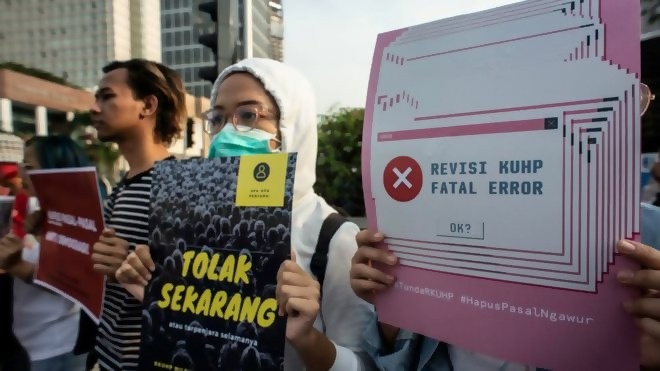Hundreds of people are pleading with President Joko Widodo to revoke the newly revised criminal code (RKUHP) due to its negative attitude towards women and other groups.
However, it is soon to be finalised, on 24th September, with parliament and the government due agree on a final draft this Sunday. Lawmakers believe that the existing penal code needs to be replaced as a way to express Indonesian independence and religiosity, since the current code is based on Dutch colonial-era laws.
Unmarried couples who live together under one roof could be jailed for six months or face a maximum fine of Rp10 million. Parents, children, spouses, or a village chief can lodge a complaint to the police. Meanwhile, women who seek an abortion, even in cases of rape, will be criminalised.
Here is a link to the draft revised penal code, according to Humans Right Watch.
Problematic Provisions in the Draft Criminal Code
Article 2 recognises “any living law” in Indonesia, which could be interpreted to include hukum adat (customary criminal law) and Sharia (Islamic law) regulations at the local level. Indonesia has hundreds of Sharia and other regulations that discriminate against women, religious minorities, and LGBT people. As there is no official list of “living laws” in Indonesia, this article could be used to prosecute people under these discriminatory regulations.
Article 417 punishes extramarital sex by up to one year in jail, the current code only says that married couples can be prosecuted for extramarital sex based on police complaints by their spouse or children. While this article does not specifically mention same-sex conduct, since same-sex relationships are not legally recognised in Indonesia, this provision effectively criminalises all same-sex conduct. It will also subject all sex workers to criminal prosecution.
Article 419 states that couples who live together without being legally married could be sentenced to six months in prison. A village head could report these couples to the police.
Article 421 criminalises “obscene acts” in public with a penalty of up to six months in prison. This article could be used to target LGBT people.
Together, articles 417, 419, and 421 violate the right to privacy for consenting adults that is protected under international law. Such provisions can reinforce or exacerbate discriminatory social norms and have heightened impact on women, who may face pressure to enter forced marriages if accused of sex outside of marriage, or an increase in societal “policing” of their behaviour.
These articles could also be used to target religious minorities and the millions of Indonesians – some estimates suggest as many as half of all Indonesian couples – who do not marry legally because of difficulties in registering their marriage. They include members of hundreds of unrecognised religions including Baha’i, Ahmadi, and local religions, as well as people in remote regencies and islands.
Article 413 criminalises the production or distribution of pornography, which is poorly defined under existing law. As Human Rights Watch has documented, the 2008 Law on Pornography, which defines portrayals of “deviant sexual intercourse” to include lesbian and male homosexual sex, has been used for discriminatory targeting of LGBT people.
Article 414 states that anyone who is “to show, to offer, to broadcast, to write, or to promote a contraception to a minor” – children under age 18 – could face a prison term or fine.
Article 416 specifies some narrow exceptions for health professionals and authorised “competent volunteers” to discuss contraception in the context of family planning, preventing sexually transmitted infections, or providing health education.
While the exceptions are notable, the overall chilling effect of article 414 will diminish free exchange of vital health information, including by teachers, parents, the media, and community members, and will most likely impede even those who are officially exempted from the law.
Sexually transmitted diseases including HIV/AIDS can be largely prevented by regularly using condoms, and interfering with people’s ability to get information about condoms impedes their rights to life and health.
Human Rights Watch has documented that restricted access to condoms has particular impacts on marginalised groups – such as men who have sex with men and female sex workers and their clients – who already shoulder most of the burden of Indonesia’s HIV epidemic.
Articles 415, 470, and 471 state that only doctors have the right to decide to perform an abortion. This conflicts with the 2009 Health Law, which says a woman can seek an abortion in “a medical emergency,” which could be interpreted to include health reasons or rape. A woman who aborts her pregnancy could be sentenced to up four years in prison. Anyone who helps a pregnant woman have an abortion could be sentenced up to five years in prison. These articles might also be interpreted to prosecute those selling or consuming so-called morning-after pills as an abortion tool, with up to a six-month jail term.
Human Rights Watch’s research in several countries has shown that criminalising abortion impedes rights protected under international law, including to life, health, freedom from torture and degrading treatment, privacy, and to determine the number and spacing of children.
Articles 304 to 309 expand the current Blasphemy Law and maintain the maximum five-year prison term. They will punish deviations from the central tenets of Indonesia’s six officially recognised religions – Islam, Protestantism, Catholicism, Hinduism, Buddhism, and Confucianism. More than 150 individuals, most of them religious minorities, have been convicted under the Blasphemy Law since it was passed in 1965, including former Jakarta Governor Basuki “Ahok” Purnama, a Christian, in 2017.
Article 118 imposes up to a four-year prison sentence on anyone who spreads Marxist-Leninist teachings.
Article 119 authorises a 10-year sentence for associating with organisations that follow a Marxist-Leninist ideology “with the intent of changing the policy of the government.”
Article 219 criminalises “insults” to the president or vice president.
Article 220 limits, but not sufficiently, application of the law to cases filed by the president or vice president.
Source: Detik and Human Rights Watch
Image: BBC




